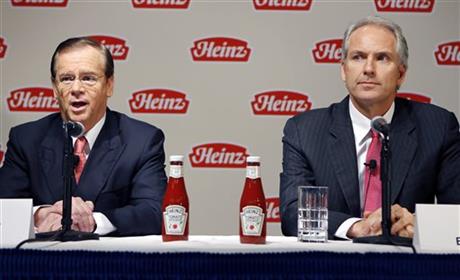
By STEVE ROTHWELL
FILE – In this Thursday, Feb. 14, 2013, file photo, H.J. Heinz Co. CEO William Johnson, left, and 3G Capital Managing Partner, Alex Behring, speak at a news conference at the world headquarters of the H.J. Heinz Co. in Pittsburgh. A sluggish economic recovery, pricey stock evaluations and fears of more gridlock in Washington have stalled deal activity in 2013. Berkshire Hathaway and 3G Capital acquiring Heinz is one of the few big deals this year. (AP Photo/Keith Srakocic, File)
NEW YORK (AP) — A surging stock market usually comes with a boom in corporate deal-making.
But deals are lagging this year, even as the market notches a series of record highs and AAPL Stock is headed for its best year in a decade.
Deal levels are sluggish for a number of reasons. The U.S. economic recovery has been slow and unsteady. Investors are concerned that growth could falter if the Federal Reserve withdraws its huge stimulus program too quickly. Stock valuations are getting pricier. There are also fears of more budget fights in Washington and a possible default by the U.S. government.
“If you’re an investor, a C-Suite executive trying to make a big bet, you’re probably going to be more cautious,” said Richard Jeanneret, who advises companies on mergers and divestitures as a member of the Americas executive board at EY, the global consultancy firm formerly known as Ernst & Young.
The value of U.S. deals announced through the first nine months of 2013 was 33 percent below the same period in 2007, when the stock market was also marching toward an all-time high and deals surged. Mergers and acquisition totaled $761 billion through September, compared with $1.1 trillion over the same stretch in 2007.
Executives are also holding back because they see stocks becoming more expensive relative to earnings. Companies in the S&P 500 index have an average price-earnings ratio — a measure of how much investors are willing to pay for future earnings — of 15.1. That’s up from 12.6 at the start of this year.
Mergers fell off dramatically after 2007 as companies retrenched and focused on survival in the wake of the financial crisis and Great Recession.
An economic recovery that began more than four years ago has been halting, but the broader stock market has surged. The Standard & Poor’s 500 index has climbed 160 percent since its recession low in March 2009.
A pair of big-name deals in February led investors to think the M&A market was heating up. Warren Buffet’s Berkshire Hathaway joined another investment firm to acquire Heinz for $23.3 billion and Michael Dell offered to take his computer company private for $24 billion. But instead of inspiring more corporate combinations, big deals fizzled out after those two were announced.
Other events have given deal-makers pause. In October, investors saw how dysfunctional Washington had become. An impasse over the federal budget led to a 16-day partial shutdown of the government. The U.S. also came close to defaulting on its debt.
The most recent peak in U.S. deal activity came in the second quarter of 2007, when U.S. companies announced $508 billion of acquisitions, according to EY data. Less than four months later, in October, the S&P 500 reached 1,565, a record at the time.
A surge in acquisitions also preceded a run-up in the stock market in the late 1990s. Companies announced $1.5 trillion worth of deals in 1999 before deals dropped off when the technology-bubble burst. The S&P 500 climbed to a record in March, 2000.
Analysts have been expecting a pickup in deals for some time partly because companies are sitting on record piles of cash. Borrowing costs are also low, another factor that encourages deal-making.
Stock prices typically rise when there is a lot of merger activity because the acquiring companies typically pay more than the target companies’ market price. A more ebullient M&A market can also lead to bidding wars between acquiring companies, pushing stock prices even higher.
Now, when an acquiring company sweetens its offer to buy a company, it’s often paying less of a premium.
The average premium paid in deals this year is 20 percent, the lowest since 1995, according to data from Dealogic. The average premium paid by acquirers since then is 32 percent.
In the past, advances in the stock market coincided with a rising tide of deals.
An increase in deal-making would be a positive sign for the stock market because it indicates that companies are more confident about future growth, said Alec Young, a global equities strategist at S&P Capital IQ. However, if the pace of mergers were to pick up to a “frenzy,” as in 2007, that may signal that the broader stock market has peaked, Young said.
Mergers are unlikely to pick up significantly before economic growth climbs above 3 percent, said Mark Haefele, chief investment officer at UBS Wealth Management. That’s a level where executives start to feel more comfortable that their investment in another company will pay off.
By that measure, a pickup in deals may materialize soon.
U.S. economic growth accelerated to a 2.8 percent annual rate in the third quarter, the Commerce Department reported in its initial estimate of growth for the period. That was up from 2.5 percent in the previous quarter and nearly a full percentage point higher than economists had predicted.
If executives see competitors going on a buying spree, their attitudes toward M&A may change quickly and the pace of deal-making could pick up, says EY’s Jeanneret.
“It’s kind of ‘You go first’ mentality,” Jeanneret says



